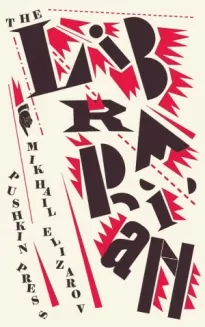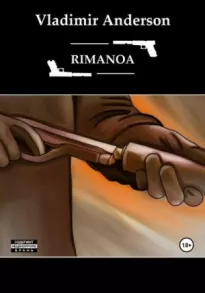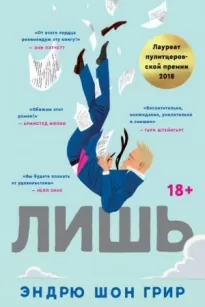The Librarian

- Автор: Михаил Елизаров
- Жанр: Современная проза / Социальная фантастика
- Дата выхода: 2015
Читать книгу "The Librarian"
THE FLIGHT
THE NEXT DAY Dezhnev, extremely alarmed, told me that Margarita Tikhonovna wasn’t answering her phone. Taking Sukharev along to help, we rushed round to her apartment, but no one opened the door to us. God only knows all the thoughts that ran through my head while Sukharev dexterously and silently broke open the lock on the door. I was already reproaching myself, because Margarita Tikhonovna, exhausted by her terrible illness, had died, overwhelmed by the stress of reading the Book of Meaning.
My worst fears were not confirmed. The apartment was simply empty. I would have thought that Margarita Tikhonovna had never reached home, if not for one strange fact that roused serious suspicions. Some elusive change had taken place in the little room that served as both sitting room and bedroom. At first I couldn’t spot which item had abandoned its long-accustomed place. I probed the room with my eyes. Protruding from the wall above the bed was an empty nail, with a rectangle of emptiness below it. Standing on the dinner table, leaning against the carafe on the brass tray was a photograph of Margarita Tikhonovna when she was still young—a portrait in a wooden frame. In this black-and-white snapshot she bore a certain resemblance to the actress Lyudmila Tselikovskaya. Cutting across the firm neck and the dimpled smile, like a crude slash from an anatomist’s scalpel, was an inscription: “To Alexei, as a keepsake”.
I picked up the portrait and was overwhelmed by a sense of unbearably bitter loss. Of course, I regretted the loss of the Book of Meaning too, but only in a material sense—it could certainly have been used to raise an incredible sum of money in the Gromov world. Its Great Design of heroic self-sacrifice and individual immortality seemed more like hell to me. More than that, I even suspected that the Book’s appearance had been prompted by the similar disenchantment of its previous owners. But there was no longer anyone with whom I could share these thoughts.
Marat Andreyevich muttered in a bewildered voice.
“At least I haven’t found her passport. So not all is lost. We’ll wait…”
We left the deserted apartment and Sukharev neatly removed all traces of a break-in.
I repent that I didn’t have the courage to tell the Shironinites the truth about the Book of Meaning, especially after my visit to the taxi dispatcher’s office. The order that Margarita Tikhonovna and I placed was in their records. The red-headed driver made no attempt to hide and told me the disheartening details. He remembered his elderly passenger very well. She really did call in first at 21 Kontorskaya Street, where she asked the driver to wait and soon came out with a small suitcase. Her second and final destination was the railway station.
I forced myself to think that Margarita Tikhonovna was alive and acting for the good of the reading room.
The waiting dragged on for the whole of the next day, but without either sight or sound of Margarita Tikhonovna. By evening the feeble hopes of her return had faded completely.
I calmed the Shironinites and cheered them up as well as I could. But every cloud has a silver lining. The jarring shock roused them from their fatal, listless torpor.
At the meeting, which was held at Lutsis’s apartment, the Shironinites voted unanimously for flight. In light of recent events, this appeared to be Margarita Tikhonovna’s dying bequest. Feverish preparations began. Everything had to be done quietly, inconspicuously and as rapidly as possible. Items that had any value at all had to be sold. No one thought about making a profit. Everybody clubbed together to buy a capacious trailer, and the essential tools, tinned food and clothing were purchased.
On the night before we fled we paid another visit to the deserted apartment on Kontorskaya Street. I wanted to collect the photograph that Margarita Tikhonovna had given me.
The moment we stepped out of the entrance on the way back, I suddenly sensed that we were being watched, and froze warily. The experienced Sukharev immediately lowered his hand into a bag of tools, took out a claw hammer and handed it to me, while he took a short crow bar and a screwdriver. Nikolai Tarasovich, waiting for us beside the Niva, had clearly also sensed that something was wrong—he was holding a weighty sledgehammer. Lutsis had hidden behind the car.
The bushes growing in an impenetrable wall along the ground floor suddenly trembled, as if from the wind, and two male figures stepped out onto the path.
The first man took a few uncertain steps towards us.
“Have you come from Margarita Tikhonovna’s?” he asked in a nervous voice that also sounded desperate to me.
“Perhaps we have…” I replied, playing for time while Denis crept up on the strangers from the rear.
“Then she’s home?” the man asked joyfully. “God, we’ve been keeping watch all day and all night!” he moved towards me confidently, as if he hadn’t noticed Nikolai Tarasovich.
Lutsis silently emerged behind the strangers’ back and readied his axe.
“And why are you watching Comrade Selivanova?” I asked pointedly.
“You’re Vyazintsev, Alexei. Maxim Danilovich’s nephew,” the man said in a confident voice. “Don’t you remember me?” He stepped into slanting light of a street lamp.
I had definitely seen that thin, haggard face with the long crooked nose before.
“You must remember!” the man exclaimed bitterly. “My name’s Garshenin. I’m from Zhanna Grigoryevna Simonyan’s reading room. And this,” he said, pointing to his companion, a stocky, blond-haired man with a boatswain’s beard, “is another of our readers, Yevgeny Ozerov. After your satisfaction I…”—he faltered, trying to find the words—“…visited Margarita Tikhonovna. It’s the only address we know, so we came here. We haven’t got anywhere else to go.”
Then I recognized him.
“But of course! They broke your arms that time. Dmitry… er…”
“…Olegovich,” the man prompted me eagerly.
“Why didn’t you tell us your name straight away?” asked Sukharev, giving Garshenin a friendly slap on the shoulder. “Nikolai Tarasovich,” he said impatiently to Ievlev, “put that hammer down, will you? These are our people…”
It was from Garshenin that we learned the whole terrible truth of the last few weeks. How Burkin’s reading room caved in to threats at the regional meeting and agreed to pay tribute to the council for the right to use its own Book of Memory—the so-called branch library arrangement—and a document was signed in confirmation. Burkin was counting on this to save his people from certain death. Simonyan categorically rejected all the council’s proposals and attempted to leave the meeting. The stubborn librarian’s way was blocked by the guards. It wasn’t clear who started the fight that immediately became a massacre. Burkin attempted unsuccessfully to halt the bloodshed and was mown down by the indiscriminately swinging axes of Lagudov’s and Shulga’s warriors.
Caught in a trap, Simonyan’s reading room made a desperate attempt to break out. Five readers managed to break through the enemy line, but only Garshenin and Ozerov escaped pursuit. Now they were outlaws, and every library or reading room was obliged to turn them in.
The fugitives made for Kolontaysk, but the new librarian Veretenov’s reading room had disappeared. Garshenin and Ozerov discovered the well-concealed traces of recent carnage. Only one of the Kolontayskites had survived—Sergei Dzyuba. He had been buried while unconscious in a common grave at the bottom of an abandoned foundation pit. Dzyuba was lucky that the disposal had not been carried out by the council’s professional gravediggers— they always inspected the bodies carefully and no witnesses were ever left alive.
Dzyuba told us how the reading room was lured out of the town by the regional prefect Tereshnikov, but the executioner’s part had been played by quite different people—the Pavliks had secretly returned to Kolontaysk. The council also let the vengeful Chakhov have Voronezh, Penza, Kostroma and Stavropol to buy him off.
The basic policy of the large clans was obvious—to use someone else to break down the regional reading rooms, without formally violating the Neverbino convention on immunity. The calculation was simple: some of the recalcitrant reading rooms would be wiped out by Chakhov, which would serve them right—certainly the Pavliks would get another Book of Memory or even a Book of Endurance, but that was no great loss—and some of the librarians, seeing the lamentable outcome of independence, would voluntarily relinquish ownership of their Book and pay membership dues to the council.
Probably a similar humane sentence in the form of a library subscription was being readied for the Shironin reading room. But was it worth waiting for it? Especially since our Niva and the motorbike had unexpectedly been augmented by the Kolontaysk reading room’s bus, in which Dzyuba, Garshenin and Ozerov had arrived. It was a genuine salvation for them to find a new reading room; we had completely solved all our transport problems, and the collective had been augmented by three seasoned fighters.
Our impressive convoy set out at dawn.





